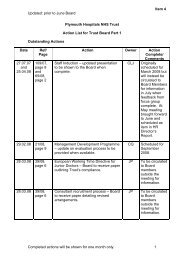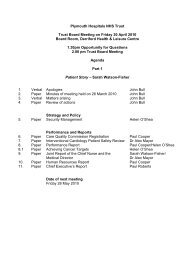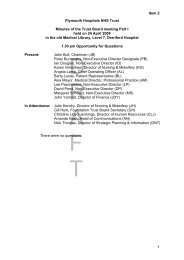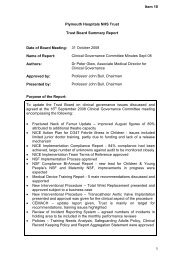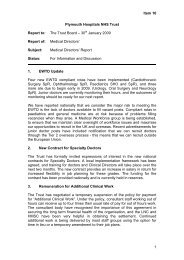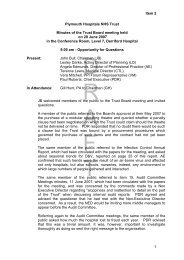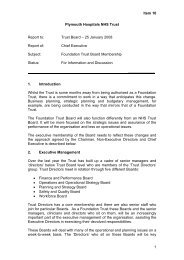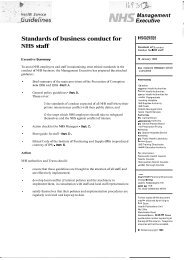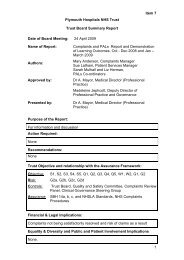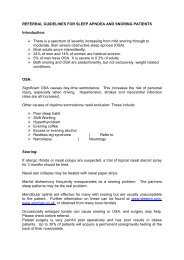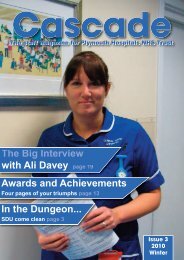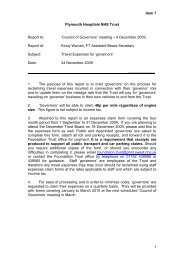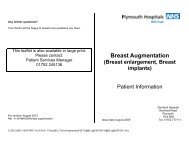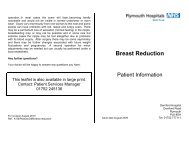Agenda and supporting papers - Plymouth Hospitals NHS Trust
Agenda and supporting papers - Plymouth Hospitals NHS Trust
Agenda and supporting papers - Plymouth Hospitals NHS Trust
You also want an ePaper? Increase the reach of your titles
YUMPU automatically turns print PDFs into web optimized ePapers that Google loves.
Item 11<br />
DETAILED REPORT<br />
<strong>Trust</strong> Board 5 July 2013<br />
Subject<br />
Prepared by<br />
Approved by<br />
Presented by<br />
Quarterly update on acute hospital st<strong>and</strong>ards for people with Learning<br />
Disabilities<br />
Associate Director of Nursing/Nurse Consultant Older People<br />
Director of Nursing & Midwifery<br />
Associate Director of Nursing<br />
Purpose<br />
People with Learning Disabilities have an equal right to healthcare. It is important, therefore,<br />
that the <strong>Trust</strong> has services, staff <strong>and</strong> support which enable people with Learning Disabilities<br />
to use our services. This report details the work undertaken to review the working of the<br />
Learning Disabilities Liaison team, the scope of practice for this team <strong>and</strong> to improve how<br />
people with Learning Disabilities are supported as they use <strong>Trust</strong> services.<br />
The <strong>Trust</strong> needs to ensure that our healthcare services provide a high st<strong>and</strong>ard of care <strong>and</strong><br />
treatment to people with Learning Disabilities, which takes into consideration <strong>and</strong> makes<br />
reasonable adjustments for their complex needs <strong>and</strong> disabilities. The <strong>Trust</strong> is committed to<br />
<strong>supporting</strong> the Getting It Right Charter - ensuring that we focus on the needs of individuals;<br />
to see the person not the disability (Annex 1).<br />
The <strong>Trust</strong> Board is required to review compliance with the national Monitor framework for<br />
st<strong>and</strong>ards of care for people with Learning Disabilities - this report provides detail of the work<br />
towards compliance (Annex 4)<br />
Background<br />
People with learning disabilities often have specific health needs, in addition to the general<br />
health needs which the rest of the population face throughout life. However, for various<br />
reasons, they often struggle to access the same level of healthcare services – both in terms<br />
of primary <strong>and</strong> secondary care. The range of specific needs people with Learning<br />
Disabilities have included:<br />
• Communication – abilities to read <strong>and</strong> write, verbal communication, sensory needs.<br />
• Memory – ability to tell the time, remember everyday facts, medication compliance.<br />
• Social – ability to forge relationships, deal with people, organise themselves, manage<br />
financial <strong>and</strong> domestic affairs, risk awareness, unemployment.<br />
• Physical needs may be linked to their learning disabilities e.g. immobility, obesity,<br />
swallowing difficulties, incontinence.<br />
• Challenging behaviours in a small number of cases.<br />
• Medical/health conditions often related to learning disabilities e.g. dental care,<br />
diabetes, epilepsy, coronary heart disease, respiratory disease, hypothyroidism,<br />
Gastro-Intestinal conditions <strong>and</strong> cancers, mental health issues.<br />
(Royal College of Nursing 2006 – Meeting the health needs of people with learning disabilities)<br />
The Death by Indifference report by Mencap (2007) highlighted the fact that people with<br />
learning disabilities receive poor care <strong>and</strong> treatment from healthcare services. The report<br />
concluded that:



